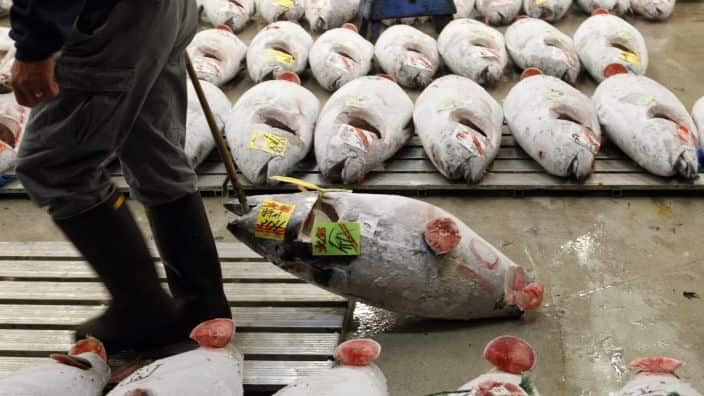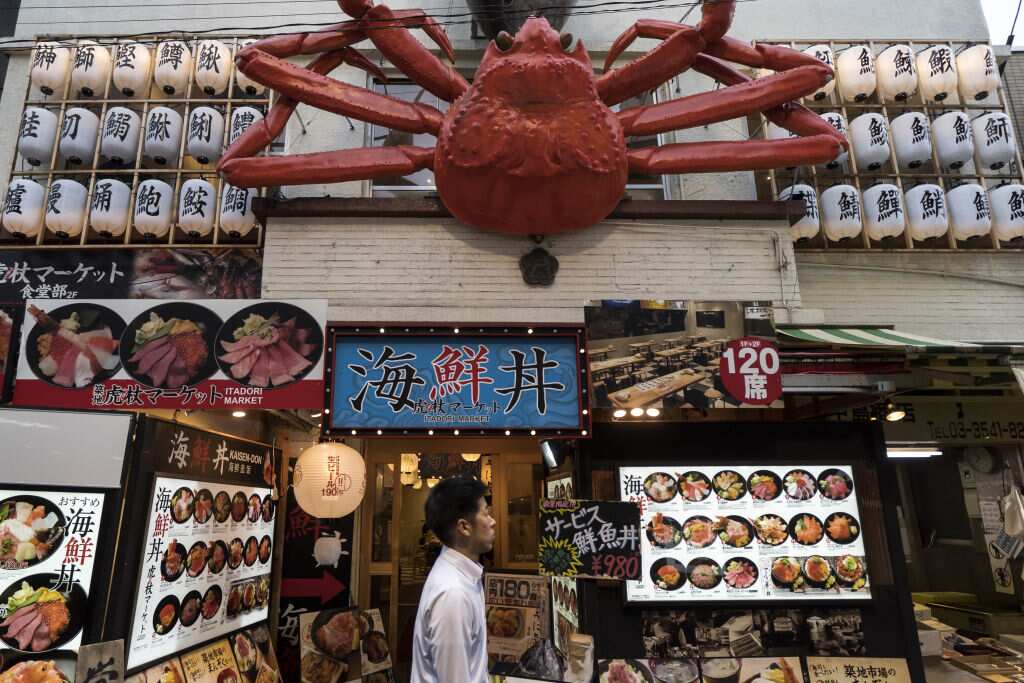Takako Arai’s earliest memories are of Tsukiji, playing hide-and-seek with her brother in the concrete maze of Tokyo’s sprawling fish market. Years later, she now runs the family’s seafood stall that sells mackerel and yellowfin tuna.
Arai and hundreds of other fish traders are reluctantly packing up and preparing to leave Tsukiji this week for a gleaming new $5 billion market on reclaimed land farther from central Tokyo.
“I feel torn. I grew up here and I feel like we’re losing so much of our history by leaving this place,” said Arai, 45.
The 83-year-old market, a popular tourist attraction, is a warren of shops and warehouses where small turret trucks zip around laden with ice-filled boxes of fish. But city officials say it has become dilapidated and unsanitary.

Many fishmongers want to stay in the area where they also live. They worry about contaminated soil at the new site in Toyosu, and the difficult commute to the new market.
More than 80 percent of Tsukiji fish traders are opposed to the move, said a survey by a group fighting the relocation.
In a last-ditch bid to delay the move, 56 traders sued the city of Tokyo last month, seeking a temporary injunction. They have asked the court to rule before Tsukiji closes on Saturday.
If there are no delays, business will resume at the new Toyosu market on Oct. 11, but traders worry their customers will not follow them.
Arai, whose family have been fish traders for 95 years, said buyers have already told her the new site is inconvenient.
“They say they’re going to buy from other markets nearer to their restaurants,” she said. “What can I say? They’re business people too.”
Fewer customers will make it hard to recoup the hundreds of thousands of dollars each fish trader expects to pay for the move, including replacing freezers and refrigerators.
Some 300 fishmongers and activists voiced their anger during a protest at Tsukiji last Saturday, chanting “Toyosu No No No,” and waving banners saying “Stop the Relocation!”
We finally made Tsukiji a famous brand and now they’re trying to destroy it.
Tourists visiting one of Tokyo’s most famous landmarks paused in the rain to join the chants.
“We finally made Tsukiji a famous brand and now they’re trying to destroy it,” said Kiyoshi Kimura, who owns one of Japan’s largest sushi chains, Sushi Zanmai.
His gravelly voice rising as he wept, Kimura recalled opening his first sushi restaurant in Tsukiji 17 years ago in a bid to draw tourists and revive the market. Kimura is famous for his winning bids at the market’s New Years auction, where in 2013 he paid a record $1.76 million for a bluefin tuna.
“They have no compassion. That’s it,” Kimura told Reuters. “These bureaucrats have forgotten that human beings live here. It’s all about money for them.”
The relocation plan has been delayed many times since it was conceived 17 years ago. In 2016, toxic substances were found in soil and groundwater at Toyosu, once home to a gas plant.
Tokyo spent an extra 3.8 billion yen ($33.5 million) to dig hundreds of wells to pump out groundwater.
In July, Tokyo Governor Yuriko Koike declared the new site safe after experts signed off on additional clean-up measures, but some fish traders remain skeptical.
An official with the Tokyo Metropolitan Government said Tsukiji had long supported the city’s residents with its lively market, but it was important for that tradition to continue in a new location with better sanitary conditions.
The old Tsukiji site will provide temporary parking for the 2020 Tokyo Olympics and eventually become a tourist centre.

Tsukiji feels like a village with its own medical clinics, a bank, library and shops, but with some 40,000 workers and tourists passing through on its busiest days.
In its final days, the market is still a frenzy of activity.
Men unload, sort, pack and display thousands of cartons of white boxes filled with fresh fish and seafood trucked in from ports across Japan.
During the early morning auctions, traders use hand signals to buy and sell fish.
The day’s catch is typically carted to a hangar where traders sell their seafood to buyers strolling down the chaotic cobblestone walkways under large store signs.
Koji Amano, one of the plaintiffs in the lawsuit, started working at Tsukiji after dropping out of high school. Now 47, he and two brothers manage a stall specializing in bluefin tuna, or “maguro,” considered the king of sushi.
As he filleted a hulk of tuna with a sword-like knife, Amano was resigned to Tsukiji’s fate.
“They’re determined to move us out,” he said. “So there’s not much we can really do to stop them.”

